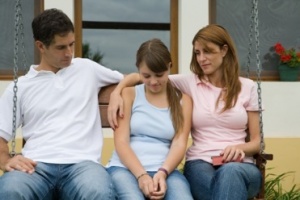Telling Your Child about a Separation and Divorce
 Research has shown that serious open parental conflict within the home causes harm, probably more harm than a divorce if the conflict goes on and on. So, a loving single-parent home is probably better than two fighting parents, but how do you tell your children? It's hard because you don't want to berate your spouse and tell your kids that they have to go because their father/mother... There is ample evidence that the traditional bitter divorce leading to the alienation of one parent is a potential disaster for the children. Also, you might be having a hard time with it yourself, and you don't know when you can tell them without getting emotional.
Research has shown that serious open parental conflict within the home causes harm, probably more harm than a divorce if the conflict goes on and on. So, a loving single-parent home is probably better than two fighting parents, but how do you tell your children? It's hard because you don't want to berate your spouse and tell your kids that they have to go because their father/mother... There is ample evidence that the traditional bitter divorce leading to the alienation of one parent is a potential disaster for the children. Also, you might be having a hard time with it yourself, and you don't know when you can tell them without getting emotional.
The children are having the same emotional reactions you are plus they are probably critical of the divorce, they may hide their feelings by often showing disapproval of mom and dad dating other people. They may feel guilty and "in the middle" of their parents' continuing battles, especially if one parent says he/she is "fighting for the benefit of the children." Although children's various developmental levels and individual personality characteristics will affect their reaction to the news that their parents are divorcing, there are certain guidelines for informing children that may be applicable to all.
What Not To Do
1. Don't wait.
It is important to tell the children as soon as a decision is made, especially if other people know about it. Many parent's dread this task, since they have probably tried to protect children from marital conflict. Most children will be surprised by the news, but others will not. It is damaging for a child to hear rumors about a marital breakup from other children or adults because it will undermine the trust they have in their parents.
2. Don't "sugar coat" the impact of divorce.
Children of all ages need to know what the immediate impact of divorce will be on their own lives. When will they see the non-custodial parent? Will they still have contact with extended family members? Will they live in the same household or will they be moving? Will their siblings be separated from them? Answers to these concrete questions will provide a sense of stability at an otherwise confusing time.
3. Don't make the non-custodial parent look like the bad guy.
Children love their parents and don't need to be persuaded otherwise. The children's interests and needs must be considered as much as the adults' preferences because they are unfairly harmed more than anyone else by the fighting.
What To Do
1. Have the whole family there when you say something for the first time.
Both parents and all siblings should be present. This scenario may be emotionally difficult, but it will reinforce to the children that the parental decision is mutual and that they will not be asked to side with either parent. Later, parents should be available to talk privately with individual children who will have varying reactions and degrees of understanding.
2. Use language that children will understand.
Clearly state that the reason for divorce is marital discord and that the child is not the cause. By stating that this decision has been made by both parents you can avoid blaming the other parent. Although your feelings about your souse may be less than positive, remember that nothing is gained by negative comments about someone your child loves.
3. Reassure children that they are still loved by both parents.
The fragility of relationships becomes frighteningly apparent to children when their parents separate. The concept that the marriage will end, but parenting will continue, is a difficult one to grasp.
4. Be aware of the resources available to assist children experiencing marital transitions.
Many good children's books about divorce have been written in recent years. If parents have been involved in counseling, children might be invited to sessions to air their feelings. Some community agencies organize peer groups for school-age children and adolescents to share the experience of being caught up in marital transitions.
5. Remember that telling children about parental separation is not a single event.
As children process the information presented to them at the initial discussion, they will need follow-up discussions that include the opportunity to ask questions and express feelings. Their understanding of divorce and the way it will affect them personally will evolve over time, and parents must be available to talk and listen as needs change.
References
Martin C. A. & Colbery K. K. (1997) Parenting: A Life Span Perspective. McGraw-Hill Companies, Inc. USA..
Mental Health Net. Coping with Divorce. htpp://www/cnhc.com/psyhelp/chap10/chap10p.htm
 RSS Feed
RSS Feed